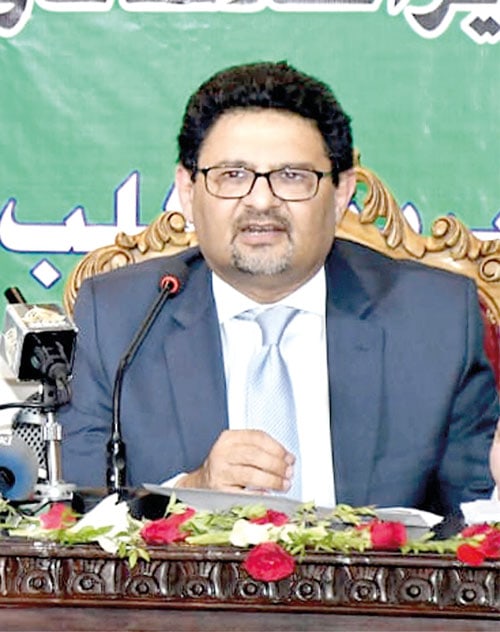Tax exemption for people earning Rs1.2m yearly to remain in place; Once construction begins on empty lands, tax will be lifted
Ijaz Kakakhel Islamabad
Federal Finance Minister Miftah Ismail on Monday said that he is hopeful that the stalled International Monetary Fund programme would be revived within a day or two.
Talking to media, the Finance Minister said that the IMF has no objection to the government’s step to increase salaries of government employees and give income tax exemption on 1.2 million (annual) income. Miftah Ismail assured that the income rebate of 1.2 million will be maintained and the government will give relief to the poor and will implement more tax on the rich people.
“I am very hopeful that the IMF programme will be revived,” the finance minister said uncertainty over the revival of the fund’s programme has depreciated the rupee against the dollar.
The authorities in the finance ministry were expected to conclude the staff-level agreement on the basis of revenue and expenditure measures that could deliver next year’s primary budget — the difference between revenues and expenditures, excluding interest payment in Rs152 billion surplus.
The Fund still has reservations over Rs9.5 trillion expenditures projected by the authorities for the next fiscal year. The revenue measures in the budget, according to IMF estimates, are also insufficient to deliver slightly over Rs7 trillion target.
The government took the toughest measures to end fuel subsidies and hiked the POL (petrol, oil, lubricants) prices up to unprecedented levels in order to convince the Fund to revive the programme.
However, the IMF is still insisting on doing more knowingly that Islamabad has turned into a “desperate borrower” mainly owing to the depletion of foreign currency reserves.
Miftah, talking about the proposed taxes on property in Senate Standing Committee on Finance, said that once construction begins on an empty plot, it will be exempted from taxes. “Lay one brick on the empty land and the taxes will be lifted. But we will not impose a tax on anyone who has not acquired the possession of a plot or has not received the permission to start construction on it,” he said.
The finance minister said if a person has been granted permission to start construction on a piece of land and they still do not begin building something on it, then they will have to pay the tax.
In the coalition government’s first budget, the finance minister proposed a 15% capital gains tax on immovable property for a one-year holding period, which will be reduced by 2.5% for every additional year.
Moreover, he has also proposed advance tax on filers to be increased to 2% from the previous 1% on the purchase of property and non-filers 5%.
The government is targeting to secure the passage of the budget 2022-23 from the National Assembly on June 27-28, according to the finance ministry’s schedule of events. For this to happen, it has to reach an agreement with the IMF so that the agreed measures could be protected in the budget. In any case, the budget has to be passed by parliament by June 28 to legally ensure its implementation with effect from July 1, as required under the Constitution.
Federal Board of Revenue Officials said that the government is preparing to amend the draft budget proposals to meet the demands set by the IMF, which has not yet approved the next loan tranche for Pakistan, and talks for the revival of $6 billion loan programme have stalled for two months.
The federal government had lowered the number of tax slabs from twelve
to seven and allowed a relief of Rs47 billion to the salaried persons, but the IMF has expressed concerns over the budgetary measure.
The Fund has instead urged the government to increase its tax collection
from the salaried person by Rs125 billion. The IMF would not revive its programme for Pakistan until the relief granted to salaries persons is reversed, said Shakeel Ahmed.
Under the existing tax slabs, monthly income below Rs50,000 is not taxed, while monthly income between Rs50,000 and Rs66,666 is taxed at the rate of 5%.
Annual income between Rs800,000 and Rs1,200,000 is taxed in the following manner. Rs. 10,000 + 12.5% of the amount exceeding Rs800,000.
Speaking to reportersn, Miftah Ismail said that the IMF had nothing to do with the increment in salaries and that the government would offer relief to the poor while the affluent will be taxed.
State Minister for Finance Dr Aisha Ghaus Pasha told the Senate Standing Committee on Finance that the previous government had agreed with the IMF to implement personal income tax reforms and other measures and had signed an agreement.









